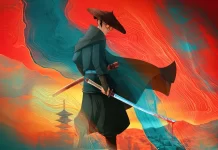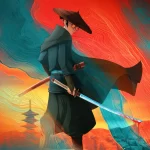As Game of Thrones mercifully ended its run last May, it left behind not two huge voids. The HBO drama kicked off in 2010, several years before Netflix’s House of Cards ushered in the new era of streaming series that dominates our lives today. The phenomenon of bingeing a season all at once would chip away — first a little then a lot — at live TV, marking the beginning of the end for the phenomena of watch-in-real-time shared cultural experiences. The Game of Thrones finale felt like the end of the end. It might very well be the last series that could unite so many viewers at once.
That bigger void might never be filled, but the smaller void, a desire for more fantasy series, has been filling up quickly. Amazon’s ambitious Lord of the Rings series remains somewhere in the unknown future, but Netflix has had tremendous success with The Witcher, which, like Thrones, is filled with not-for-kids sex and violence. The Letter for the King hopes to be the next big fantasy hit, but for the junior high-and-younger crowd (or really anyone who likes their fantasy stories with a lower body count, zero beheadings, and only the tamest sort of sensuality).
Sign up for TV Guide’s Free Daily Recommendations Newsletter!
The series’ name will likely be unfamiliar for most English-speaking viewers but that’s because the English-speaking world is late to the party when it comes to the Dutch writer and illustrator Tonke Dragt. Released in 1962, The Letter for the King became a phenomenon in the Netherlands and elsewhere, but didn’t receive an English translation until 2013. (Now 89, Dragt remains active. She released a book in 2017.) The first of two novels set in the same fantasy world, The Letter for the King was previously adapted into a 2008 Dutch film that tried to squeeze its story down to feature length. Running six episodes, this new series stretches out the story and takes some liberties with the source material, playing very much like an old-fashioned fantasy story refitted in the mold of a streaming-era series aimed at the YA crowd. That mostly works in the series’ favor, however, from the appealing cast to the suspenseful endings that defy viewers not to play the next episode immediately.
The series’ first moments drop us into a long-ago world in which the northern kingdoms of Unauwen and Dagonaut are winding down a war with their southern neighbors in Eviellan thanks to the pitiless efforts of the Unauwen prince Viridian (Gijs Blom). Eviellan, we soon learn, has designs on strengthening his power, designs that coincide with an ominous gathering darkness that threatens the land. It will take a special hero to combat this darkness, a narrator reveals early on, one that’s yet to emerge.
 Amir Wilson, The Letter for the King
Amir Wilson, The Letter for the King
Created by William Davies (a veteran writer/producer whose credits include everything from Johnny English to the first How to Train Your Dragon movie), the series leans into familiar fantasy tropes. It’s a Chosen One story filled with quests and dire enemies and it makes no apologies for it. But it also subverts some of those elements, including throwing in a bit of narrative sleight of hand in a later episode designed to pull the rug out from under viewers.
The tinkering with formula starts even earlier. Its unlikely hero looks extremely unlikely. The likable but decidedly unimposing Amir Wilson stars as Tiuri, a teenager trying to become a knight and not finding it easy. Born in Eviellan and adopted by a Dagonaut noble, he seems like a total washout compared to other squires, and only some well-placed bribes from his father allow him to pass onto the next round. That includes spending a solemn, silent night in a spooky, remote temple among the other squires, a night interrupted by the arrival of a page serving the legendary, but badly wounded, Black Knight with the White Shield. With his dying breath, the Black Knight charges Tiuri with taking a letter to the king of the land warning of Viridian’s plans.
The Best Movies and TV Shows to Watch on Netflix in March
Tiuri’s journey gives the series its focus, but several other subplots unfold around it (and eventually converge upon it). He’s hunted by the dread Red Riders but also the former squires who served alongside him, a fun bunch of characters who find their loyalties beginning to shift as they learn more of Tiuri’s story. Along the way he meets the spirited, roguish Lavinia (Ruby Ashbourne Serkis, in a winning performance), who becomes a reluctant ally as he makes his way through dangerous terrain, including a monastery that’s home to (maybe) reformed criminals.
Without losing the adventurous spirit of classic children’s fantasy writing, Davies makes some smart choices to give the story a contemporary spin. The Eviellans, Tiuri among them, have darker skin than the northern conquerors and the scripts explore notions of otherness and cultural differences, misplaced assumptions, and misunderstandings without letting those themes get in the way of the adventure. Mostly, however, it clips along from one memorable location and action scene to another as first Tiuri, then Tirui and Lavinia, face perils that range from the relentless Red Riders to a traveling magician who senses the presence of real magic when he nears them — an element that becomes increasingly important as the series heads toward a finale that leaves the door open for future installments.
If they match this season, they’d be quite welcome. The Letter for the King won’t offer many surprises to veteran fantasy fans, but they’re likely to be won over by the charismatic cast and impressive production values. (It can’t match Game of Thrones, but the New Zealand and Czech Republic locations offer plenty of sweeping vistas all the same.) And newcomers to fantasy series should be spellbound by all the clashing swords and misty mountains. It’s an ideal, unthreatening gateway to bigger, darker, fictional worlds.
TV Guide Rating: 3/5
The Letter for the King premieres Friday, Mar. 20 on Netflix.
 Gijs Blom, The Letter for the King
Gijs Blom, The Letter for the King



















![[Book Review] The Blade Itself (The First Law Trilogy) by Joe Abercrombie](https://bendthekneegot.com/wp-content/uploads/2018/01/1516047103_maxresdefault-218x150.jpg)
















